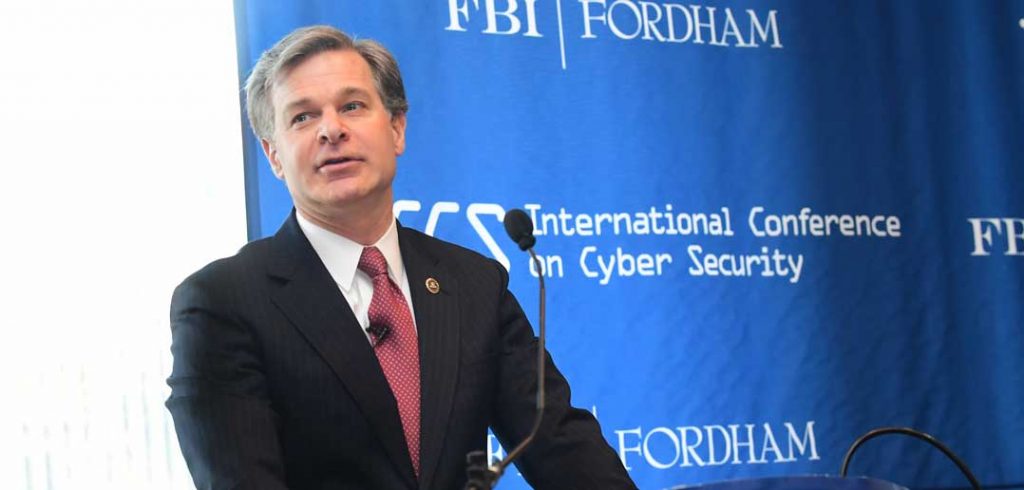As high-impact cybercrimes grow in frequency, sophistication, and malevolence, the director of the Federal Bureau of Investigation called on government and private industry to give law enforcement tools to do its job prosecuting criminals.
FBI Director Christopher A. Wray gave the keynote at the Jan. 9 opening session of the Fordham-FBI 2018 International Conference on Cyber Security. He spoke of “the Going Dark problem” of protected electronic devices, and the lapse of part of the Foreign Intelligence Surveillance Act (FISA), should Congress fail to renew it this month.
Due to an industry practice of encrypting cell phones, computers, and other electronic consumer products, Wray said that last year the FBI was unable to access the content of nearly 7,800 devices, even though “there is lawful authority to do so.”
“Each one of those devices is tied to a specific subject, a specific defendant, a specific victim, a specific threat.,” said Wray, who was appointed last year following President Trump’s firing of then-director James Comey. “We are not looking for a ‘back door’ . . .[but]the ability to access the device once we’ve obtained a warrant from an independent judge, who has said we have probable cause.”
“it’s an urgent public safety issue.”
He also called for the immediate extension of Section 702 of the FISA, which allows the government warrantless monitoring of internet and phone communications to gather foreign intelligence information.
Wray, a former federal prosecutor who was in private practice when tapped for the director’s position, gave his talk from the “fresh perspective” of someone returning to law enforcement after approximately a decade.
“Back then, ‘tweeting’ was something only birds did. Now…well, let’s just say it’s something that’s a little more on my radar,” Wray said.
Wray defended the agency’s impartiality, saying that it is the honest process, not the result, that his FBI agents are passionate about.
“If the bureau starts chasing results, that’s fool’s gold. There is always going to be somebody unhappy about something that we do,” he said. “[We] let the facts go where they go.”
Higher Stakes, More Complexities
Since he last worked in law enforcement, Wray said “the [cyber]threats are growing more complex, and the stakes are higher than ever.” In fact, he noted that the term “cybercrime” is nearing redundancy, as nearly all crimes today—from terrorism to human trafficking to gangs to organized crime—involve some technological or digital component.
The FBI has been successful in infiltrating and destroying some major global operations: Wray mentioned the takedown last summer of AlphaBay, an online black market for drugs, malware, stolen identities, and more. Yet upcoming challenges incorporating more AI and cryptocurrencies will require new approaches and collaborations.
To those ends, he said, one of the main challenges facing the FBI today is finding persons who are high-end cyber-proficient, and to raise the game to stay ahead of threats. “The sad realization is that there are too few people in this country—in any country—who have that expertise. It’s a great place to be, if you are a college kid right now.”
Joseph M. McShane, S.J., president of Fordham, introduced Wray and fielded questions to him following his talk. Citing the foreign meddling in the 2016 U.S. presidential election, Father McShane emphasized cybersecurity’s vital contribution to world institutions.
“The work the FBI does has never been more important, not merely to the security of democratically-elected governments, but to world markets and to the infrastructure of civilization itself.”
(Read Director Wray’s full remarks.)
READ MORE ICCS DAY 1 COVERAGE:
To Take Out Dark Net Marketplace, Luck, Skill, Cooperation Required
Operation Harbor: an Insider’s Look at the Hunt for a German Router Hacker

